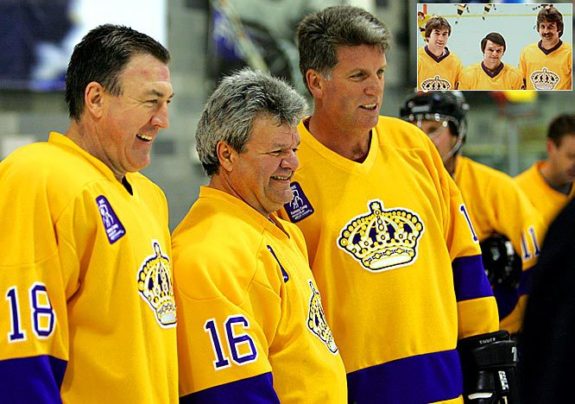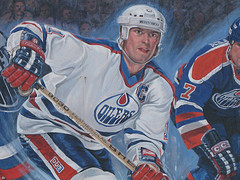Over the years, the Stanley Cup has been awarded to a multitude of teams that have battled their way to hockey immortality through blood, sweat, and tears. The road to the Stanley Cup is seldom an easy one, and sometimes it takes some heartbreak for a team to ultimately win hockey’s most prized possession. While the Edmonton Oilers became one of the NHL’s best dynasties during the mid-to-late 1980s, they didn’t become the powerhouse team that everyone feared without some letdowns and learning experiences.

Perhaps the biggest learning experience for the Oilers came in 1982 when an eighth seeded Los Angeles Kings team dispatched the young Edmonton team in a best-of-five series. Despite the fact that the Oilers were stocked with players such as Wayne Gretzky, Mark Messier, Glenn Anderson, Grant Fuhr, Kevin Lowe, and many more talented individuals, the Los Angeles Kings managed to pull off one of the biggest upsets in playoff history by sending the Oilers home after five games played. Winning the Smythe Division battle with the Oilers was undoubtedly a huge victory for the underdog Los Angeles Kings, but both teams managed to make history in game three of the playoff series as they played what was arguably one of the greatest (if not THE greatest) Stanley Cup Playoff games in the history of the NHL postseason.
A Playoff Game For The History Books
The 1982 Smythe Division match-up between the Edmonton Oilers and the Los Angeles Kings was one that was lopsided to say the

least. The Edmonton Oilers had finished 48 points ahead of the Los Angeles Kings in the regular season standings, and when the postseason rolled around it was safe to say that many had the Oilers pegged as heavy favorites to win the opening round series. While the Oilers finished 31 games above .500, the Los Angeles Kings ended up placing second to last in the Smythe Division with a sub-.500 (24-41-15) record.
Despite the fact that the Oilers and Kings were two completely different teams when they met in the 1982 Stanley Cup Playoffs, they didn’t fail to entertain fans in the first two games as game one featured a collective eighteen goal effort and game two featured a classic low-scoring duel. However, the defining point of the series would occur in game three as the Los Angeles Kings made it known that they were not a team that would lay their cards down at the first sign of trouble.
Going into game three, the Oilers and Kings had split their first two playoff games, but the third game of the series proved to be quite the difference maker. By the end of the second period of the game, the Oilers had staked themselves to a 5-0 lead courtesy of goals from Wayne Gretzky, Mark Messier, Lee Fogolin, and Risto Siltanen. Some might say that a three goal lead is the worst type of lead to play with in a hockey game, but after going up by five scores the Oilers were certainly confident in themselves as several players started to laugh at the lackluster effort by the Los Angeles Kings.
After returning from the second intermission, the Kings came out determined to change their fate as Jay Wells, Doug Smith, and Charlie Simmer cut the deficit to 5-3. Not only did the three strikes put the Oilers on the edge, the Kings were able to get their home crowd back in the building – a factor that was taken away from the home team at quite an early stage. While the Los Angeles Forum rocked back to life, the young Edmonton Oilers buckled under the pressure as Garry Unger took a five-minute major for high sticking Dave Lewis. As the Kings and Oilers skated four-on-four, Mark Hardy tallied the Kings’ fourth score of the night as he beat Grant Fuhr, and the epic comeback would be completed in the final ten seconds of the contest as Steve Bozek’s tying goal sent the Forum into a frenzy.
It wouldn’t take long for the Kings to break through in overtime as Daryl Evans rifled a shot past Grant Fuhr only two minutes and forty-five seconds into the extra frame. With the Kings’ comeback complete, momentum certainly swung in Los Angeles’ favor, but the game that was dubbed the “Miracle on Manchester” had a number of effects on the Kings and Oilers.
The Implications
Not only was the Miracle on Manchester a demoralizing game for the Edmonton Oilers, it was also a contest that established the fact that the Los Angeles Kings were serious about advancing to the next round. Even though the Oilers came back to win game four of the Smythe Division Semi-Finals, the Kings developed a confidence in their game that eventually helped them seal Edmonton’s fate in the fifth and deciding game of the division semi-finals.
If you don’t believe me, here’s a bit of a (lengthy) depiction of what the Miracle on Manchester meant for some of the Kings’ players:
For the Los Angeles Kings, winning game three of their best of five series in such an epic fashion reinforced the team’s confidence and propelled them to a series victory against the up-and-coming Oilers. On the other hand, the developing Edmonton Oilers experienced the type of effort and concentration that it would take to advance in the Stanley Cup Playoffs. The Oilers would certainly experience more heartbreak in the coming years, but the “Miracle on Manchester” and the team’s subsequent loss to an otherwise unremarkable Los Angeles team certainly contributed to Edmonton’s learning curve.
Does the “Miracle on Manchester” Set the Bar?
While hockey fans have experienced a fair share of upsets and comebacks in the Stanley Cup Playoffs, the “Miracle on Manchester” undoubtedly sets the bar for amazing playoff games. It could have been so much easier for the ’81-’82 Kings to decide to pack it in and collect themselves for their next playoff contest against the Oilers, but the ability to persevere and come through in twenty minutes of play after being dominated for the majority of the game is a Herculean measure that stands unrivaled to this day.
Whether or not the “Miracle on Manchester” was/is the greatest playoff game ever played will probably be up for debate amongst the staunchest of hockey lovers, but it will certainly be engrained in the memories of both the younger and older generations of hockey loyalists. If anything, the “Miracle on Manchester” has resonated in the minds of hockey fans because it illustrated that a team should never underestimate their opponent, no matter how tempting the scoreboard or standings make it seem.